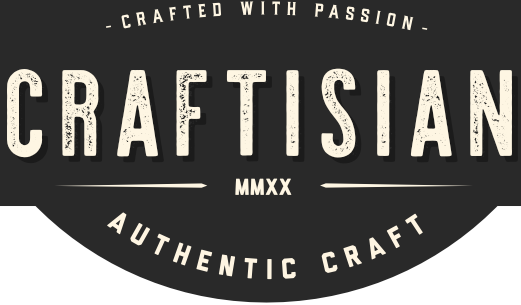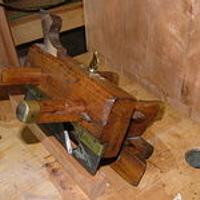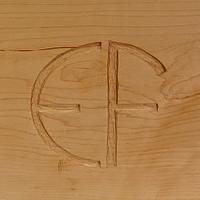Share your craft projects
Make new craft buddies
Ask craft questions
Blog your craft journey
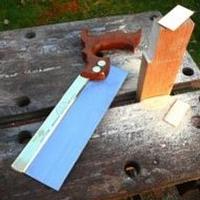
Brit
474 posts
and
40 followers
in over 11 years
in over 11 years
More from Brit
YouTube makes me laugh
Beginner's Guide to Sharpening Western Saws
The Humble Hand Brace - A Beginner's Guide to Restoring, Buying and Using #8: Part 8 - Tips and Tricks on Using a Hand Brace
The Humble Hand Brace - A Beginner's Guide to Restoring, Buying and Using #7: Part 7 - Sharpening an Auger Bit
The Humble Hand Brace - A Beginner's Guide to Restoring, Buying and Using #6: Part 6 - What to Look for when Buying a Secondhand Brace and more
Carving a Welsh Love Spoon #1: Designing the Spoon
This is
part 1
in a
5 part
series:
Carving a Welsh Love Spoon
This blog was originally posted on another woodworking forum back in 2015. The fact that I finished this project a long time ago means you won't have to wait too long for the next episode. LOL.
Designing the Spoon
On my woodworking bucket list, I've always wanted to have a go at carving a ball in a cage and a chain. With this in mind, I decided to incorporate these elements into my next spoon project (This will be my 4th spoon). So I grabbed a suitable piece of Lindenwood (lime in the UK, basswood in the US) and sketched out my design. I went through a number of iterations before ending up with this.
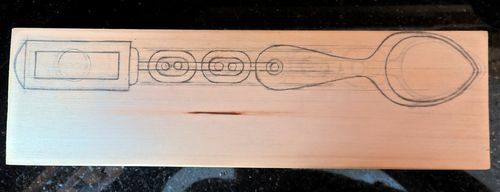
However, while I was ripping down the two sides of the spoon with my saw, it occurred to me that a caged ball and a chain were two elements often found in traditional Welsh Love Spoons, so I decided to tweak my design a bit more and try my hand at carving one of those. After far too much pontificating, I ended up with this.

For those of you who haven't heard of Welsh Love Spoons before, the tradition started in the 16th century when shy, bashful young men would hand carve a spoon as a token of their affection for one of the local hotties. They would expend a great deal of time and effort in designing and carving the spoon and many a candle lit evening would be given over to this pursuit. If the girl accepted the spoon, it signified that she was interested in 'stepping out' with the boy and a relationship would ensue. The community would then recognize them as a 'couple'. It must be remembered too that engagement and marriage were not common in rural Wales until the end of the 18th century. Most young people would just live together in a simple house where the spoon would hang on the wall much like a wedding photograph does today.
Although the carving of 'love spoons' is not unique to Wales, I don't think any other country went so far in terms of decorating their spoons. There is really only one hard and fast rule when carving the spoon which is that it must be carved from a single piece of wood. Typically, the bowl of the spoon would remain quite simple and understated, whilst the handle of the spoon would be more elaborately decorated with symbols of the young man's affection. These design elements remained pretty constant right across Wales, but the exact meaning of them seemed to vary from region to region. Here are some of the elements that you might find on a Welsh Love Spoon together with what they signify:
Chain = together forever
Diamond = wealth or good fortune
Flower = affection
Cross = faith
Ball(s) in a cage = love held safe or the number of children desired
Heart = love
Horseshoe = good luck
Key or keyhole = security
Celtic knotwork = eternal love
Lock = security or I shall look after you
Twisted stem = two lives become one
Dragon = symbol of Wales or protection
The bowl of the spoon also symbolized that the young man would provide for the girl and the intricacy of the design and the skill with which it was executed, let the girl know that the young man was good with his hands and practical.
So if we look again at the design I'm going for, you can see that it incorporates some of the above elements.
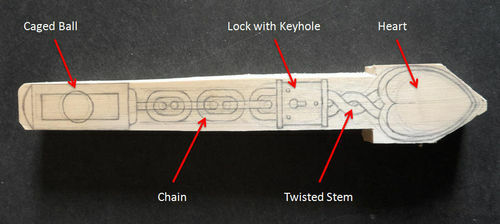
Since the caged ball and the spoon bowl involve the most aggressive knife work, I think I'll tackle those elements first and keep the existing strength in the middle section until the heavy work is complete. So in the next episode, I'll show you how I go about carving the caged ball. I'm kind of making it up as I go along here folks, but I hope you'll find it interesting and informative and perhaps even have a go yourself.
Ok cover me, I'm going in.
Andy -- Old Chinese proverb say: If you think something can't be done, don't interrupt man who is doing it.
5 Comments
This is a cool tradition, thanks for the writeup and explanations.
I wonder - after 55 years of wedded bliss, is it too late to do this for my sweetie?, I think I'd like to try this.
Looking forward to the next installment of this blog, curious to see if the chain section is carved completely through and the links are flexible, or rigid.
I wonder - after 55 years of wedded bliss, is it too late to do this for my sweetie?, I think I'd like to try this.
Looking forward to the next installment of this blog, curious to see if the chain section is carved completely through and the links are flexible, or rigid.
Very interesting about the Welsh Love Spoon. This will be fun to follow.
Main Street to the Mountains
Thanks for writing this up, Andy.
Tom, I think any time is a good time to do nice things for your sweetie!
Tom, I think any time is a good time to do nice things for your sweetie!
May you have the day you deserve!
Brit,
Thanks for all the information. It's nice to learn something even in old age! I'd like to convince my hubby to carve one for me.
L/W
Thanks for all the information. It's nice to learn something even in old age! I'd like to convince my hubby to carve one for me.
L/W
“Those who would give up essential Liberty, to purchase a little temporary Safety, deserve neither Liberty nor Safety.” Benjamin Franklin
Softie!
If your first cut is too short... Take the second cut from the longer end... LBD
More from Brit
YouTube makes me laugh
Beginner's Guide to Sharpening Western Saws
The Humble Hand Brace - A Beginner's Guide to Restoring, Buying and Using #8: Part 8 - Tips and Tricks on Using a Hand Brace
The Humble Hand Brace - A Beginner's Guide to Restoring, Buying and Using #7: Part 7 - Sharpening an Auger Bit
The Humble Hand Brace - A Beginner's Guide to Restoring, Buying and Using #6: Part 6 - What to Look for when Buying a Secondhand Brace and more








